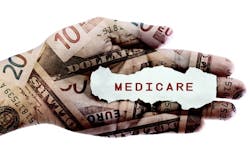A new, independent evaluation has found that accountable care organizations (ACOs), Medicare’s dominant value-based care initiative serving nearly 11 million seniors, lowered spending by $3.53 billion from 2013 to 2017 and saved $755 million after paying shared savings.
The research is the latest in a series of analyses that has demonstrated ACOs’ value to Medicare, particularly during a time when there’s been significant debate over the results these organizations have delivered to date.
According to a Dec. 3 news release from the National Association of ACOs (NAACOS), this latest evaluation, conducted by the analytic firm Dobson|DaVanzo & Associates, compared ACO spending to similar non-ACO providers and patients to determine what spending would be in the absence of ACOs. This is in contrast to how the Centers for Medicare & Medicaid Services (CMS) has judged performance based on benchmarks, an ACO’s annual, pre-determined spending target, according to NAACOS, which has previously alleged that the government has calculated ACO savings the wrong way.
“The firm used research methods called as-treated difference-in-differences design, which are rigorous and widely accepted to estimate savings and losses,” NAACOS stated. Dobson previously conducted analysis through 2015 and 2016, and the Medicare Payment Advisory Commission (MedPAC) has used a similar approach to analyze ACO savings, according to NAACOS.
“These results are undeniable,” said Clif Gaus, President and CEO of NAACOS. “There hasn’t been another voluntary initiative in Medicare that has generated billions in savings over such a short period of time.”
This latest research found that the Medicare Shared Savings Program (MSSP)—the largest value-based payment model in the U.S.—generated around 1 percent in savings relative to comparison groups, which is consistent with what others, including MedPAC in its June 2019 report to Congress, have reported. Researchers from Harvard University have also shown similar results, NAACOS pointed out.
ACOs in the Shared Savings Program care for nearly 11 million Medicare seniors through 518 ACOs, although the latter number is down from 561 ACOs last year after changes CMS enacted through its Pathways to Success regulation.
Indeed, the final rule from CMS is broadly designed to push Medicare ACOs more quickly into two-sided risk models as federal healthcare leaders have criticized those organizations that have stayed in upside-only risk models. When ACOs are in a one-sided risk model, they do not share losses with the government when they overspend past their benchmarks, but they do share in the gains. As such, in these one-sided risk models, CMS is on the hook for any losses all on its own.
“[Upside-only] ACOs have no incentive, at all, to reduce healthcare costs while improving outcomes, as they were intended. Thus, the program has not lived up to the accountability part of their name,” Verma said last year.
But policy researchers and industry groups such as NAACOS have firmly pushed back on this notion, pointing out that ACOs need time in one-sided risk models to build up the necessary infrastructure first, before taking on downside risk, which requires time.
Time, however, is something that ACOs will have less of, per the Pathways to Success final rule, which decreases the allowed period of time that an ACO can remain in a one-sided risk model from six years to, at most, three years for new “low-revenue” or physician-led ACOs, two years for all other new ACOs, and one year for existing one-sided ACOs. What’s more, CMS said that the percentage of shared savings these one-sided risk ACOs could keep will also decrease.
The debate around this issue heated up even more in September when NAACOS leaders wrote an opinion piece in the Health Affairs Blog, noting that In 2019, the Shared Savings Program experienced a dip in ACO participation for the first time since it started in 2012, according to CMS data.
They wrote, “Fewer than half the number of new ACOs joined this year compared to the average of all previous years. While more ACOs than ever are taking on risk for their performance, ACOs dropped out of the program at record numbers as well, according to our analysis of publicly available data. While not yet a reason to sound an alarm, these data will be problematic for the Medicare program, patients, taxpayers, and providers if they continue. Policy makers should pay close attention as we move forward.”
CMS has essentially taken the stance that it understands some ACOs will drop out as a result of the final Pathways to Success regulation, but that it’s time for the program to evolve since the feds believe that ACOs in upside-only risk models are not very effective.


